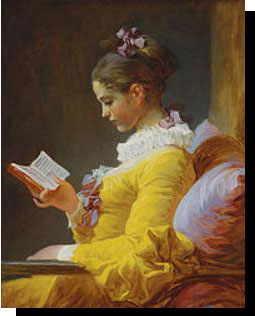Literature
"No man but a blockhead ever wrote,
except for money." ― Dr. Samuel Johnson

Top 100 Novels
The word literature literally means "things
made from letters" and the pars pro toto term "letters" is sometimes used to signify "literature," as in the
figures of speech "arts and letters" and "man of letters." Literature is commonly classified as having two major
forms—fiction and non-fiction—and two major techniques—poetry and prose.
Literature may consist of texts based on factual information (journalistic or
non-fiction), as well as on original imagination, such as polemical works as well as autobiography, and reflective
essays as well as belles-lettres. Literature can be classified according to historical periods, genres, and
political influences. The genre consists of artistic works which fall within a certain central theme:
romance, mystery, crime, fantasy, erotica, adventure. Important historical periods in English literature include
Old and Middle English, the Renaissance, the 17th Century Shakespearean, the 18th Century Restoration, 19th Century
Victorian and 20th Century Modernism. Important intellectual movements that have influenced the study of literature
include feminism, post-colonialism, psychoanalysis, post-structuralism, Post-modernism, romanticism, and
Marxism.
The epics of Homer (liad,
Odyssey) and Hesiod (Works, Days, Theogony) are some of the earliest and most influential of Ancient Greek
literature. Classical Greek genres include philosophy, poetry, historiography, comedies and dramas. Plato and
Aristotle authored philosophical texts that are the foundation of Western philosophy; Sappho and Pindar were
influential lyrical poets; Herodotus and Thucydides were early Greek historians. Of the hundreds of
tragedies, dramas and comedies written during the classical age only a limited number of plays by a few authors
still exist: Aeschylus, Sophocles, Euripides and Aristophanes.
Literature of the Middle Ages explored the lives of saints,
miraculous events and, most characteristically, the drama and adventure of romance with its sometimes magical
narrative. Controversial, religious, political and instructional literature proliferated during the
Renaissance as a result of the invention of printing, while the mediaeval romance developed into a more
character-based and psychological form of narrative - the novel.
In the Age of Reason philosophical tracts and speculations on human nature integrated
literature with social and political developments. The inevitable reaction was the explosion of Romanticism in the
later 18th century which reclaimed the imaginative and fantastical bias of old romances and folk-literature and
asserted the primacy of individual experience and emotion.
19th century European
fiction evolved towards realism and naturalism, documenting real life and social trends (al
la Zola) with an often polemical tone.
20th century fiction and drama moved back towards the subjective,
emphasizing unconscious motivations and social and environmental pressures on the individual. Proust,
Eliot, Joyce and Kafka exemplify the trend of documenting internal rather than external
realities.
Overview of
the Western Canon
Poetry
A poem uses aesthetic qualities of language, with the aid of
imagery and metaphor, to evoke emotions within the reader. Written in verse, poems have rhythmic
structure based on patterns of stresses (metric feet) or on patterns of different-length syllables; and they
may or may not utilize rhyme. Due to the diversity of poetic forms and structures, poetry can be difficult to
define and characterize. How to Write
Poetry.
Early examples of poetry include the Sumerian Epic of Gilgamesh
(~2700 B.C.), parts of the Bible, the Iliad, the Odyssey, and the Indian epics Ramayana and
Mahabharata.
Essay
An essay consists of a discussion of a topic from an author's
personal point of view. "Essay" in English derives from the French word for "to attempt”. The
term "essays" first applied to the self-reflective musings of Michel de Montaigne, the so-called ‘father’ of
the essay. Genres include the memoir and the epistle.
History
The
literature of history has a utilitarian purpose which is to record data or to convey immediate information.
Historical literature often lacks a literary quality save for literary journalism and the genre of ‘creative
nonfiction’. Major literary historians include Herodotus, Thucydides and Procopius.
Drama
Drama typically
comprises dialogue between characters with the aim of dramatic or theatric performance. Greek drama
exemplifies the earliest form of drama. During the 18th and 19th centuries, opera developed as a combination of
poetry, drama, and music. Nearly all drama took verse form until comparatively recently. Shakespeare’s classic
romantic drama ‘Romeo and Juliet’ is generally accepted as literature.
The tragedy has its origins in religious and civic festivals based
on well-known historical or mythological themes, often very serious.
Literary
Criticism
Literary criticism is the study, evaluation, and interpretation of literature.
Literary criticism is often published in essay or book form. Academic literary critics teach in literature
departments and publish in academic journals, and more popular critics publish their criticism in broadly
circulating periodicals such as the Times Literary Supplement, the New York Times Book Review, the New York Review
of Books, the London Review of Books, The Nation, and The New Yorker.
History of Literary Criticism
z
| 